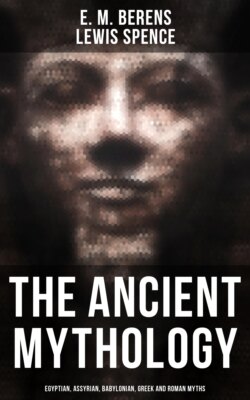Читать книгу The Ancient Mythology: Egyptian, Assyrian, Babylonian, Greek and Roman Myths - Lewis Spence - Страница 112
На сайте Литреса книга снята с продажи.
Ninib as an Assyrian War-God
ОглавлениеSuch a deity as Ninib (another name for Nin-girsu, the god of Lagash) was certain to find favour among the Assyrians by virtue of those characteristics which would render him a valuable ally in war. We find several kings extolling his prowess as a warrior, notably Tiglath-pileser I, and Assur-rishishi, who allude to him as "the courageous one," and "the mighty one of the gods." His old status as a sun-and-wind god, in which he was regarded as overthrowing and levelling with the ground everything which stood in his path, would supply him with the reputation necessary to a god of battles. He is associated with Asshur in this capacity, and Tiglath-pileser brackets them as those "who fulfil his desire." But Ninib's chief votary was Assur-nazir-pal (858-60 B.C.), who commenced his annals with a pæan of praise in honour of Ninib, which so abounds in fulsome eulogy that we feel that either he must have felt much beholden to the god, or else have suffered from religious mania. The epithets he employs in praise of Ninib are those usually lavished upon the greatest of gods only. This proceeding secured immense popularity for Ninib and gave him a social and political vogue which nothing else could have given, and we find Shamsi-ramman, the grandson of Assur-nazir-pal, employing the selfsame titles in honouring him.
The great temple of Ninib was situated in Calah, the official residence of Assur-nazir-pal, and within its walls that monarch placed a tablet recording his deeds, and a great statue of the god. He further endowed his cult so that it might enjoy continuance.
We can readily understand how the especial favour shown to such a god as Ninib by an Assyrian monarch originated. Asshur would be regarded by them as much too popular and national a deity to choose as a personal patron. But more difficult to comprehend are the precise reasons which actuated the Assyrian kings, or indeed the kings of any similar ancient state, in choosing their patrons. Does a polytheistic condition of religion permit of the fine selection of patron deities, or is it not much more probable that the artful offices of ecclesiastical and political wire-pullers had much to do with moulding the preferences of the King before and after he reached the throne? The education of the monarch while yet a prince would almost certainly be entrusted to a high ecclesiastical dignitary, and although many examples to the contrary exist, we are pretty safe in assuming that whatever the complexion of the tutor's mind, that of the pupil would to some extent reflect it. On the other hand there is no resisting the conclusion that the Assyrian kings were very often vulgar parvenus, ostentatious and 'impossible,' as such people usually are, and that, after the manner of their kind, they 'doted' upon everything ancient, and, possibly, everything Babylonian, just as the later Romans praised everything Greek.
